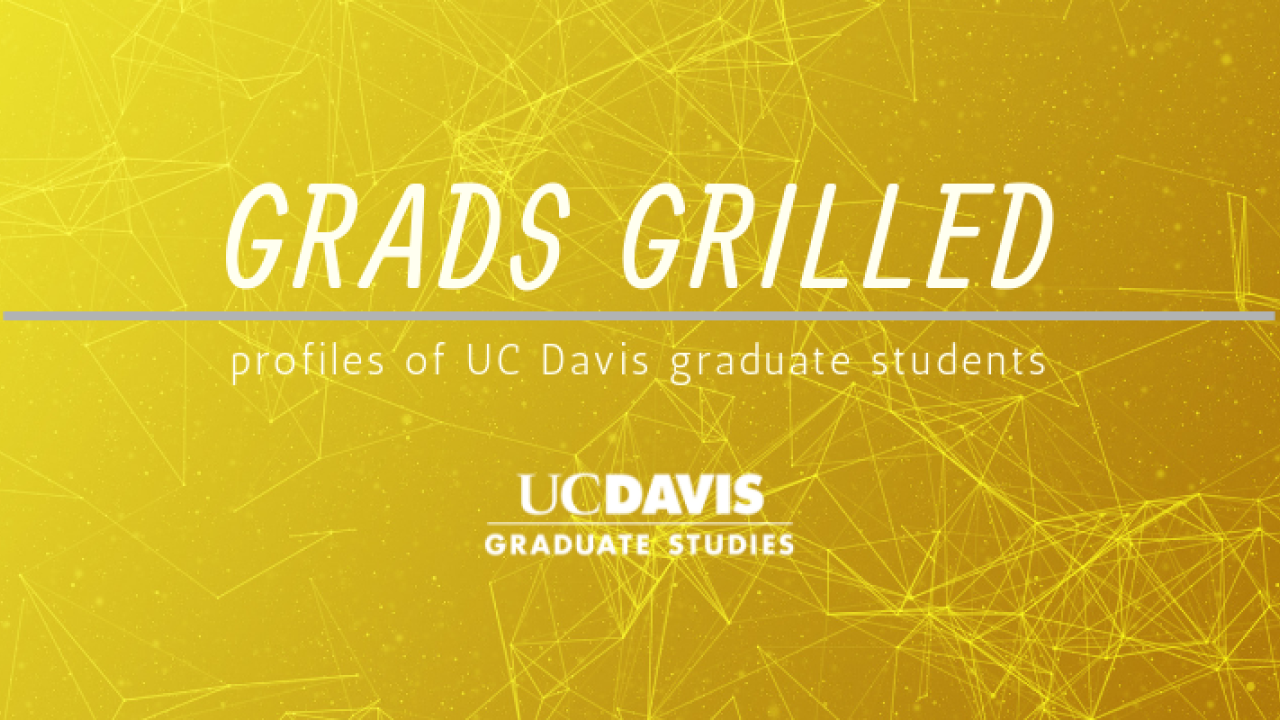
Graduate Student Profile: Emily Moline, Linguistics
Meet UC Davis Graduate Student Emily Moline
- Department
Linguistics
- Program
Ph.D.
- Previous degrees and colleges
BA Linguistics and Spanish with a certificate in TESOL, University of Florida
MA Linguistics, UC Davis
- Where did you grow up?
Tallahassee, FL
- Where do you live now?
Sacramento, CA
- What's your favorite spot in Davis?
Sitting at a table, anticipating a plate of tacos at Taquería Davis.
- How do you relax?
It’s a balance between the mindfulness of yoga and the aggression of kickboxing.
- What was the last book you read for pleasure?
The Static Element: The Selected Poems of Natan Zach
- What TV show are you currently binge-watching?
The new Twin Peaks
- Research interests
I’m a researcher in literacy, sociolinguistics, and applied linguistics. My dissertation is an analysis of emergent adult literacy learning, specifically investigating the strategies that adults rely upon when they learn how to read, and how these intersect with the pedagogical techniques used by their teachers as well as the broader policies of the program and contemporary approaches to the teaching of adult literacy in general. As part of my research, I’m a consultant and volunteer for a community-based literacy learning program in Northern California, Yolo Reads, which I encourage anyone looking for a great volunteer experience to check out.
- Dissertation title or topic
L1 and L2 Adult Emergent Literacy: Reading Patterns, Interactions, and Policies Within an English Literacy Program
- Please share a surprising or noteworthy fact or finding from your research
Adults learning to read make very different kinds of errors than children do. For instance, since adults have so much more exposure to the word of environmental print (e.g. signs and advertisements) than children do, they can make reading errors that children never would—for instance, reading the word “Jeep” as “Cherokee” due to the collocation of these words on Jeep cars (a real example from my data).
- Which professor or class inspired you to pursue graduate studies?
I’ve been lucky to have been inspired by a series of great mentors, starting with my high school IB Coordinator Dr. Sue Newman, who sparked (and then continued to push) my interest in linguistics and philosophy, and then Dr. MJ Hardman, whose Jaqi language documentation project I worked on for all four years of my degree at the University of Florida, and who saw in me a fellow researcher.
- Which scholarly text do you wish you had written? Why?
I couldn’t possibly have done it myself, but Paolo Freire’s Pedagogy of the Oppressed is foundational as a work that reconfigured the possibility for relationships of empowerment among teachers, students, and society at large, foregrounding the importance of decolonization and considerations of social class in pedagogy.
- What's the best thing about being a grad student?
Setting my own schedule.
- What's the worst?
Setting my own schedule! Sometimes my days consist of endlessly more inventive ways to avoid tackling that tricky task, and there’s no one there to keep me honest except my houseplants.
- If you weren't a grad student, what would you be doing?
I’d be teaching English in Madrid, my home away from home.
- Finally, please ask yourself a question - "I’ll take a page from my friend and former colleague Renee Kemp and choose to answer the other question linguists get asked all the time: So, do I have to watch my grammar around you?"
It’s actually the opposite—linguistics is the study of language as it’s spoken/used, and as such, we’re out to describe, not prescribe. (In fact, much linguistics research has gone into how we can get people to speak as naturally as possible while still being recorded, and not speak as they think they should around a researcher!) The “standard” form of a language is a dialect or variety of that language like any other—it just so happens that it has been accorded prestige and value through social processes. It’s not more logical or grammatical than any other way of speaking. All this being said, I am also a freelance academic copy editor and proofreader, so I sometimes joke that I’m a traitorous closet prescriptivist.
Graduate student profile courtesy of the UC Davis College of Letters and Science.
About Graduate Studies
Graduate Studies at UC Davis includes over 100 dynamic degree programs and a diverse and interactive student body from around the world. Known for our state-of-the-art research facilities, productive laboratories and progressive spirit – UC Davis offers collaborative and interdisciplinary curricula through graduate groups and designated emphasis options, bringing students and faculty of different academic disciplines together to address real-world challenges.
UC Davis graduate students and postdoctoral scholars become leaders in their fields: researchers, teachers, politicians, mentors and entrepreneurs. They go on to guide, define and impact change within our global community.
For information on Graduate Studies’ current strategic initiatives, visit the Graduate Studies strategic plan page.
